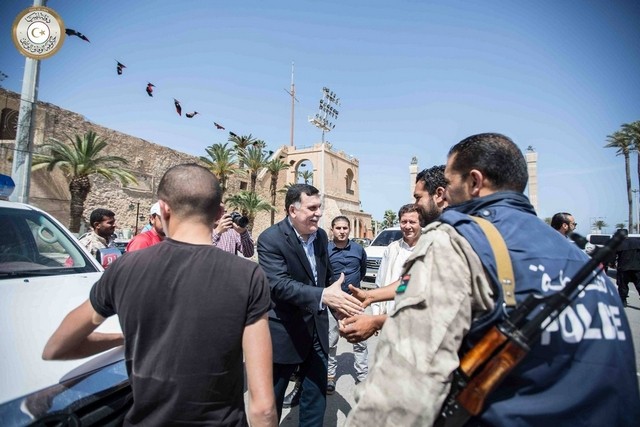
LIBYA’S UNITY GOVERNMENT: BACK IN TOWN

On Wednesday, March 30 members of Libya’s UN-backed unity government defied an air blockade imposed by rival militias and made the short sea journey from their base in Tunis to set up shop in Tripoli.
The unity government, headed by Prime Minister Fayez Al Sarraj and backed by the U.S. and European powers, immediately went to work establishing its presence in the Libyan capital, holding a news conference and speaking at a local mosque.
The arrival of the unity government is expected to use increase momentum in the fight against ISIS in Libya, which has established a stronghold in the southern town of Sirte.
However, Libya is still beset by deep divisions. The unity government is one of three rival governments vying for control of Libya and a patchwork of other militias claim control over different areas of the country. Establishing its authority across the city and gaining the trust of these groups will be the main challenge for the UN-backed government in the coming weeks.
Meanwhile, the fight against ISIS will be fragmented and Western governments may have to work with a range of actors on the ground, each of which claims to have authority over a particular area.
AN IMPENDING IMPEACHMENT VOTE IN BRAZIL

We have been reporting on the situation in Brazil for a number of weeks as the situation developed. It now looks more likely than at any point previously that President Dilma Rousseff will be impeached.
In a party vote on Tuesday, March 29 the Brazilian Democratic Movement Party (PMDB) decided to break with the governing coalition headed by the embattled Rousseff.
The PMDB is the largest party in Brazil’s lower house and the loss of its support is a major blow to Ms. Rousseff’s hopes of securing the 171 votes needed to defeat an impeachment vote.
Although the vote is not expected until mid-April, a special impeachment commission is likely to make a recommendation by April 10. While this vote won’t have any concrete impact it will serve as an important litmus test of support for Rousseff.
Meanwhile, Vice President and leader of the PMDB, Michel Temer, appears to have his eye on the presidency. Although the 75-year-old has pledged not to contest the next presidential election in 2018, he has positioned himself as an experienced politician ideally placed to manage a difficult transition.
KENYA’S PRESIDENT VISITS EUROPE

On Monday, April 4 Kenyan President Uhuru Kenyatta will begin official visits to France and Germany in a bid to seek increased investment from the continent.
One topic that will no doubt be on the agenda on Kenyatta’s visit to Paris is a proposed pipeline from landlocked Uganda to port facilities in either Tanzania or Kenya. Mr. Kenyatta would like to see the pipeline traverse his country, which will also be required to construct new infrastructure to transport its own oil.
However, an announcement by Tanzanian President John Magufuli earlier this month appears to suggest an agreement with French energy giant Total S.A. to fund construction of a $4bn Uganda-Tanzania pipeline, which will bypass Kenya completely.
OTHER DEVELOPMENTS
SATURDAY, APRIL 9
UN-backed Syrian peace talks resume in Geneva, despite a request by the Assad regime for the talks to by pushed back until after April 13 parliamentary elections.
SUNDAY, APRIL 10
A ceasefire deal struck between Saudi Arabia and Houthi rebels in Yemen will come into effect. Following this, on April 18, peace talks between the warring factions will begin in the Saudi capital of Riyadh.
Simon is the founder of Foreign Brief who served as managing director from 2015 to 2021. A lawyer by training, Simon has worked as an analyst and adviser in the private sector and government. Simon’s desire to help clients understand global developments in a contextualised way underpinned the establishment of Foreign Brief. This aspiration remains the organisation’s driving principle.

